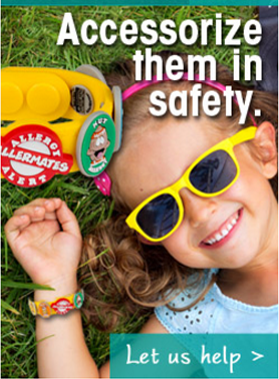
New to this kids health thing? Or a seasoned pro? Either way, we all need a hand sometime, and you are sure to find yours at AllerMates. Check out our allergy (below), asthma, gluten free and diabetes sections for tons of resources all here to help you navigate this crazy world of your kids health.
Allergies

Kids Allergies: What You Need to Know
So your kid has an allergy, or even more than one… don’t despair! The AllerMates team is here to help.You’re not alone in this. We’re on your side, and on the side of millions of children with food allergies and other severe allergies. We’ve put together a lot of important information and tips to help you take control and manage your kid’s allergies, and it’s all in plain English.This is your place for practical wisdom and sound advice that will keep your child safe while making your life a little easier. Below, we’ve listed the most important things you can do to get started.
- 1 Never share food with friends
- 2 Don’t eat anything unless you know it’s safe
- 3 Read food labels, or have an adult read them first to be sure there are no allergens
- 4 Tell an adult if you start to feel sick or strange after eating
- 5 And of course, every child should know which foods he or she is allergic to and the most common things they can’t eat

MEDICAL CARE
If you suspect your kid has allergies but have not been to a doctor yet, make that appointment right now! Doctors can test to find out what your child is allergic to, monitor to see if symptoms get worse or better, and provide prescription medicine to help make symptoms go away. There is no “cure” for allergies*, so being able to manage reactions quickly and effectively is very important. Reactions can escalate quickly and even become life-threatening, and the only way to stop many reactions is with epinephrine. For some kids’ allergies, desensitization treatments (allergy shots) can help reduce or eliminate reactions over time. But these don’t always work and aren’t available for every allergen.
COMMUNICATE WITH OTHERS
Who’s in charge when you’re not around? Every adult who helps care for your child must know about allergy problems. Teachers, babysitters, camp counselors, friends and family members should be aware of what your child is allergic to, the symptoms of an allergic reaction, and how to respond if he or she has a reaction. If emergency medication is prescribed, all caregivers should learn how and when to use it. A Food Allergy Action Plan will help caregivers know what to do in an emergency, and a wristband or other allergy ID jewelry can help alert and remind them to be vigilant Read more
reaction starts,
act fast!
- Children should tell an adult
- Use emergency medication if prescribed. Do it exactly the way the doctor has explained and the way you have practiced

ASK OUR MEDICAL EXPERTS
We get questions from parents and caregivers daily regarding kids’ allergies, and we go straight to the source for the answers – the experts, our doctors.




